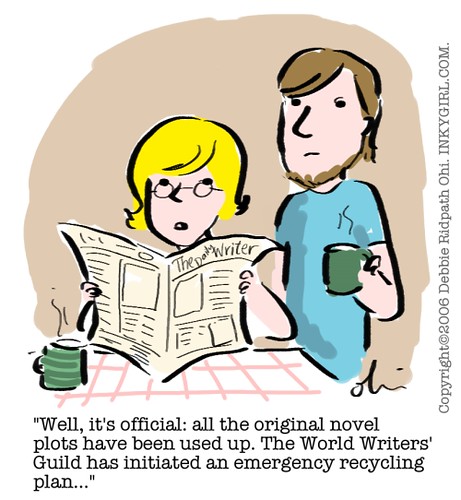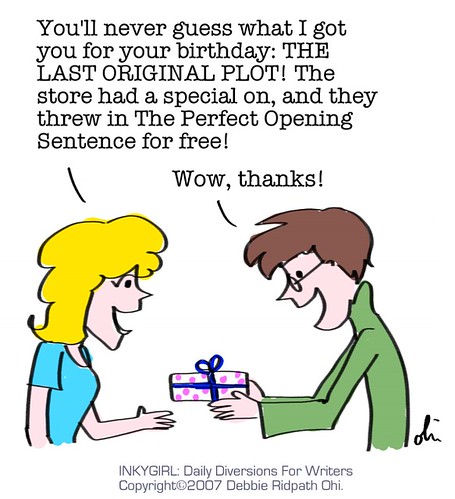Are there any original plots left?
I’ve gotten into the habit of keeping a notebook of plot ideas. Sometimes these are just fragments; other times I’ll fill up pages of brainstorming. I leave all these ideas to simmer a while and then make a point of revisiting them later to see if any still appeal to me.
What I’m finding more often than not: it’s tough to come up with a completely original plot. Or if I think I’ve come up with an original plot, then I’ll come across a painfully similar story in the bookstore just a few weeks later.
I guess I shouldn’t be surprised. People have been writing stories for a long time, after all; no wonder all the basic story patterns have already been used. In Where Can I Find An Original Plot, Richard Young theorizes that there is really only ONE plot in literature:
‘The central character needs something, very, very badly. Failure to get this thing or do this thing will have dire consequences for this character or his or her loved ones. To begin with, every effort she or he makes to get this thing only adds to the complications and makes success look even less likely, but in the end there is a resolution, and either the protagonist gets the thing, and avoids the dire consequences, or doesn’t, and the feared dire consequences come to pass.’
In The Solution To Coming Up With A Unique Plot Is To Understand What That Actually Means, Mark Walton advises writers NOT to throw out a story just because its plot is too similar to stories already out there.
Another tip: if you see a book out there with a story similar to yours, try not to assume that someone stole the idea from you.
Instead of investing too much energy trying to find The Unique Plot That Has Never Been Done Before, focus instead of making your story original through other means, like:
Setting: Choose an unusual or unexpected setting. Writing a zombie story? Don’t have the zombies attack your heroine in the graveyard. How about a shopping mall instead? Or a Tupperware party? A writers’ conference?
Characters: Avoid character stereotypes. From Teresa Hopper’s article about plot and character:
We’ve all seen the Catholic Priest Experiencing Doubt, the Tortured Main Character, the Virginal Heroine, the Cynical and Unbelieving Police Chief, and many more. Real people aren’t like this.
Dialogue: Make your dialogue realistic (see Robert Sawyer’s tips). Read your dialogue out loud to see how it sounds, read books with great dialogue, and obey dialogue rules (see Karen Hertzberg’s tips).
Voice: Develop an original voice (see tips by Laura Backes, Holly Lisle,AboutFreelancing.com, ).
And make your writing the best it can possibly be.
Any other tips for making your story original? Please do post them below!




{ 3 trackbacks }
{ 4 comments… read them below or add one }
Wow. Those are all awesome links. Thank you for putting those together, and for the advice.
I agree that the plot doesn’t have to be completely original. I mean, every plot can be boiled down to the same thing: “Stuff happened.”
However, I find if I start off thinking about the basic elements of a story (the main character wants something and can’t get it yet) I head in the wrong direction. It’s easier for me to think of setting first, and then place my characters in it, then see what happens when they stay true to their character. I wrestle too much with what the perfect idea is if I think about what it is my character should be wanting.
Also, a tip for dialogue…there are a lot of audiobooks being published online as podcasts now. I often try to picture sections of dialogue ending up as a podcast audiobook somewhere, and imagine my friends doing the different voices.
Sometimes I even get them to record for me!
If the dialogue doesn’t sound good then, I’ll know it’s not natural.
Even recording myself doing the narration, (though creepy to hear my own voice) helps determine the flow of the story. Just reading it out loud sometimes doesn’t cut it for me.
Debbie, I love the one basic plot! Although I thought in comedy you could also have “in the end, the protagonist finds out that the thing he thought he wanted isn’t really the thing he wanted.” Like all those Shakespeare “guy pursues wrong girl and finally falls in love with right girl” comedies. But I tend to forget that every scene should make success look less and less likely.
But recently a writer friend told me when she outlines her scenes, she adds a note for each scene called “Failure” that explains how her viewpoint character has failed in that scene to reach his/her goal. It’s a good check to make sure that things are always going worse for the protagonist.
Reesha, I’m with you on the setting. I just lurrve interesting settings. Then I can get the right characters in them and figure out what they want. Um, hopefully anyway.
Bummer! I wanted the last original plot for my birthday. Great post Debbie. I love your cartoons!
I agree that making the protagonist’s ability to achieve their goal really heightens a story.
I also think voice is a contributor here too. I mean, who doesn’t love the Cinderella story in some form? I could probably read a hundred different books, all with that Cinderella plot line, and love it everytime. But what makes each time fresh and different is the voice and the twists that the writer has brought into the story.
I’m off to check out your links. Thanks!
Great post! As Avi said at a writer’s conference, “There are no new stories, only fresh ways to tell old ones.”